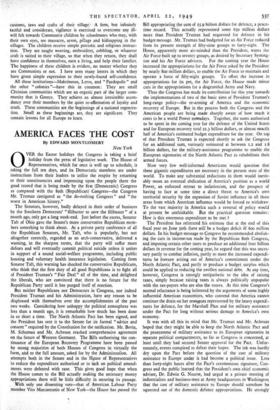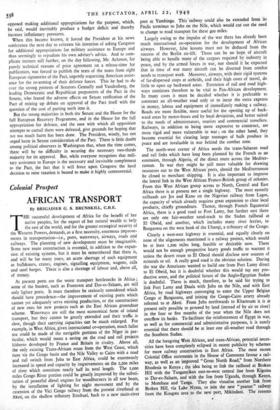AMERICA FACES THE COST
By EDWARD MONTGOMERY New York 0 VER the Easter holidays the Congress is taking a brief holiday from the press of legislative work. The House of Representatives, which for once is well up to schedule, is taking the fell ten days, and its Democratic members are under instructions from their leaders to utilise the respite by returning to their constituencies and impressing upon the people there the good record that is being made by the &at (Democratic) Congress as compared with the Both (Republican) Congress—the Congress Mr. Truman castigated as " the do-nothing Congress " and " the worst in American history."
The Senators, however, badly delayed in their order of business by the Southern Democrats' "filibuster to save the filibuster" of a month ago, only got a long week-end. Just before the recess, Senator Taft of Ohio gave the Senate's more conservative Republican mem- bers something to think about. At a private party conference of all the Republican Senators, Mr. Taft, who is popularly, but not altogether correctly, regarded as an arch-conservative, delivered a warning, 'in the sharpest terms, that the party will suffer more defeats and will eventually commit political suicide unless it unites in support of a sound social-welfare programme, including public housing and voluntary health insurance legislation. Coming from Senator Taft, this warning has shocked the conservative Republicans, who think that the first duty of all good Republicans is to fight all of President Truman's " Fair Deal " all of the time, and delighted the liberals, who are convinced that there is no future for the Republican Party until it has purged itself of reaction.
But neither Republicans nor Democrats in Congress, nor indeed President Truman and his Administration, have any reason to be displeased with themselves over the accomplishments of the past two weeks. Considering how unhappy the political atmosphere was less than a month ago, it is remarkable how much has been done in so short a time. The North Atlantic Pact has been signed, and the President has sent it to the Senate for its formal " advice and consent " required by the Constitution for the ratification. Mr. Bevin, M. Schuman and Mr. Acheson reached comprehensive agreement on the future of Western Germany. The Bills authorising the con- tinuance of the European Recovery Programme have been passed by strong majorities of both Houses of Congress in virtually the form, and to the full amount, asked for by the Administration. All attempts both in the Senate and in the H9use of Representatives to reduce the expenditure authorised or to tack on political amend- ments were defeated with ease. This gives good hope that when the House comes to the Bill actually making the necessary money appropriations there will be little difficulty in securing its passage.
With only one dissenting vote—that of American Labour Party member Vito Marcantonio of New York—the House has passed the Bill appropriating the sum of 15.9 billion dollars for defence, a peace- time record. This actually represented some 630 million dollars more than President Truman had requested for defence in his budget message. Mr. Truman had budgeted for an Air Force reduced from its present strength of fifty-nine groups to forty-eight. The House, apparently more air-minded than the President, wants the Air Force built up to seventy groups, as desired by Secretary Syming- ton and his Air Force advisers. For the coming year the House increased the appropriations for the Air Force asked by the President by nearly goo million dollars, to enable the Air Force to maintain and operate a force of fifty-eight groups. To offset the increase in appropriations for its pet, the Air Force, the House made minor cuts in the appropriations for a disgruntled Army and Navy.
Thus the Congress has made its contribution for this year towards the implementations of two of the basic aims of President Truman's long-range policy—the re-arming of America and the economic recovery of Europe. But in the process both the Congress and the American people are being made sharply aware of how much it costs to be a world Power nowadays. Together, the sums authorised to be spent in the coming year for the defence of the United States and for European recovery total 21.3 billion dollars, or almost exactly half of America's estimated budget expenditure for the year. On top of that President Truman is expected shortly to ask the Congress for an additional sum, variously estimated at between 1.2 and 1.8 billion dollars, for the military-assistance programme to enable the European signatories of the North Atlantic Pact to rehabilitate their armed forces.
Now very few well-informed Americans would question that these gigantic expenditures are necessary in the present state of the world. To make any substantial reductions in them would inevit- ably mean an eventual abdication of America's position as a world Power, an enforced retreat to isolationism, and the prospect of having to face at some time a direct threat to America's own territorial security by the expansion of Soviet influence in all those areas from which American influence would be forced to withdraw. To the vast majority in America such a reversal of policy would at present be unthinkable. But the practical question remains : How is this enormous expenditure to be met ?
The President has reiterated his estimate that at the end of this fiscal year on June 3oth there will be a budget deficit of 600 million dollars. In his budget message to Congress he recommended abolish- ing the cuts in income-tax made by the Republican Both Congress, and imposing certain other taxes to produce an additional four billion dollars in revenue for the coining year, he argued that this was neces- sary partly to combat inflation, partly to meet the increased expendi- tures he foresaw arising out of America's commitment under the North Atlantic Pact, and partly to produce a budget surplus which could be applied to reducing the swollen national debt. At any time, however, Congress is strongly antipathetic to the idea of- raising taxes, simply because raising taxes is always politically unpopular with the tax-payers who are also the voters. At this time Congress's normal reluctance is being bolstered by the arguments of some highly influential American economists, who contend that America cannot continue the drain on her resoces represented by the heavy expendi- tures for defence, for the Marshall Plan and for military assistance under the Pact for long without serious damage to America's own economy.
It was with all this in mind that Mr. Truman and Mr. Acheson hoped that they might be able to keep the North Atlantic Pact and the proaranune of military assistance to its European signatories In separate political compartments, so far as Congress is concerned, at least until they had secured Senate approval for the Pact. Unfor- tunately, events conspired to defeat their hopes. The ink was hardly dry upon the Pact before the question of the cost of military assistance to Europe under It had become a political issue. Less than forty-eight hours after the Pact's ceremonious signature, Con- gress and the public learned that the President's own chief economic adviser, Dr. Edwin G. Nourse, had urged at a private meeting of industrialists and business-men at Army headquarters in Washington that the cost of military assistance to Europe should somehow be squeezed out of the domestic defence appropriations. He strongly opposed making additional appropriations for the purpose, which, he said, would inevitably produce a budget deficit and thereby increase inflationary pressures.
When this became known, it forced the President at his news conference the next day to reiterate his intention of asking Congress for additional appropriations for military assistance to Europe and thus seemingly to repudiate his own adviser's advice. And to com- plicate matters still further, on the day following, Mr. Acheson, for purely technical reasons of prior agreement on a release-time for publication, was forced to publish the texts of the notes from eight European signatories of the Pact, urgently requesting American assist- ance for the re-arming of their defence forces. This he had to do over the strong protests of Senators Connally and Vandenberg, the leading Democratic and Republican proponents of the Pact in the Senate, who feared the adverse effects on Senate ratification of the Pact of mixing up debate on approval of the Pact itself with the question of the cost of putting teeth into it.
But the strong majorities in both the Senate and the House for the full European Recovery Programme, and in the House for the full appropriation for defence, and the ease with which all opposition attempts to curtail them were defeated,,give grounds for hoping that not too much harm has been done. The President, wisely, has not urged haste in Senate consideration of the Pact. There is little doubt among political observers in Washington that, when the time comes, there will be no difficulty in securing the necessary two-thirds majority for its approval. But, while everyone recognises that mili- tary assistance to Europe is the necessary and inevitable complement to the Pact, the fact that it will force upon Congress the hard decision to raise taxation is bound to make it highly controversial.



































 Previous page
Previous page